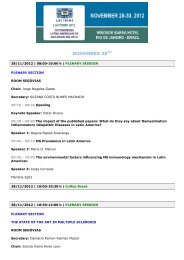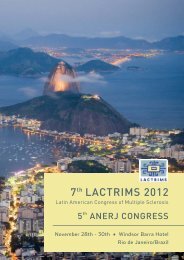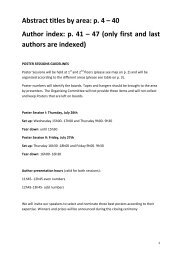Keynote Conference - Interevent
Keynote Conference - Interevent
Keynote Conference - Interevent
Create successful ePaper yourself
Turn your PDF publications into a flip-book with our unique Google optimized e-Paper software.
Symp#10 Cell Biology and Education<br />
ASCB & IFCB Symposium<br />
Chairs Bruce Alberts and Cynthia Jensen<br />
Cell Biology and Education<br />
Jensen, C.G.<br />
Department of Anatomy with Radiology<br />
University of Auckland, Auckland, New Zealand<br />
Although Cell Biologists have a wide range of research interests, they all have a common interest in teaching cell and<br />
molecular biology to undergraduate and postgraduate students and in training masters and PhD students and<br />
postdoctoral fellows in research techniques. The speakers and discussants at this symposium will describe a variety of<br />
methods of teaching and training in cell biology, including descriptions of special courses and distance teaching. There<br />
will be an opportunity for discussion, and questions and comments from the audience will be encouraged.<br />
Teaching at Distance: Interactive Multimedia of the Cell Biology of Trypanosoma cruzi<br />
Benchimol, M. 1, 2 , Teixeira, D.E. 2 , Crepaldi, P.H. 1,4 3, 4<br />
; De Souza, W.<br />
1<br />
Universidade Santa Úrsula, Rio de Janeiro, RJ, Brasil<br />
2<br />
Fundação CECIERJ, Rio de Janeiro, RJ, Brasil.<br />
3 Instituto de Biofisica Carlos Chagas Filho, Universidade Federal do Rio de Janeiro, Brasil<br />
4 INMETRO, Rio de Janeiro, RJ, Brasil<br />
CECIERJ is a state public foundation focused in education. It includes the CEDERJ arm, which is specialized in teaching<br />
at distance as university. Our group has developed an intense work producing multimedia material to undergraduate<br />
students in Biology. The aim of this work was to develop educational materials in the graphical version using threedimensional<br />
(3D) animations, to visualize the morphology, dynamic processes and basic knowledge of the Cell Biology<br />
as a whole and here, in special of Trypanosoma cruzi, the causative agent of Chagas´ disease. Parasitic protozoa are<br />
important agents of human and veterinary diseases not only in Brazil but also all over the world. The life cycle of these<br />
protozoa is presented in different levels of education, from fundamental school to graduation level. Videos and<br />
animations include: cell division, endocytosis and flagellar beating; the interaction of the parasite with a vertebrate<br />
host cell and the behavior of this protozoan in the digestive tract of the invertebrate host. Thus, this material could: (1)<br />
facilitate the cell biology of parasites learning and teaching, (2) provide good material which can be used by several<br />
people at different levels, such as lectures, classes, research, thesis, etc.<br />
Supported by CNPq, FAPERJ and CECIERJ<br />
Engaging Undergraduate Students in Research<br />
Kiaran Kirk<br />
Research School of Biology, The Australian National University, Canberra, ACT, 0200, Australia<br />
There are many benefits to be gained from engaging high-achieving students in ‘real research’ from as early as possible<br />
in their undergraduate career. At the Australian National University we offer students the opportunity to do<br />
laboratory-based ‘Biology Research Projects’ that count as courses towards their Science degree. We have also<br />
introduced a research-focused (and highly-selected) degree, the ‘Bachelor of Philosophy’, in which a quarter of the<br />
courses taken over a three year period are in the form of research projects. Our experience with this mode of teaching<br />
will be discussed.<br />
62





